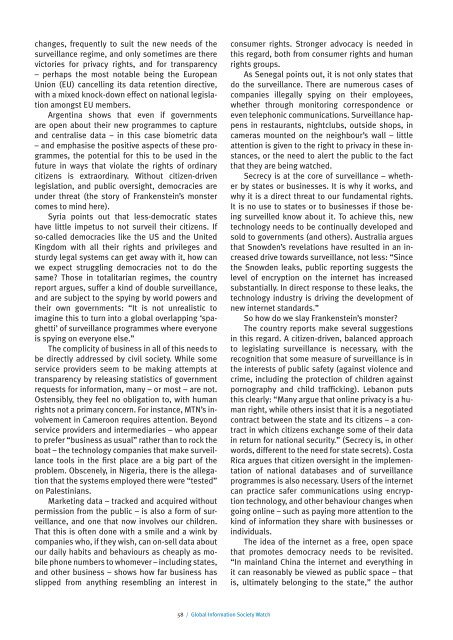W7y8w3
W7y8w3
W7y8w3
Create successful ePaper yourself
Turn your PDF publications into a flip-book with our unique Google optimized e-Paper software.
changes, frequently to suit the new needs of thesurveillance regime, and only sometimes are therevictories for privacy rights, and for transparency– perhaps the most notable being the EuropeanUnion (EU) cancelling its data retention directive,with a mixed knock-down effect on national legislationamongst EU members.Argentina shows that even if governmentsare open about their new programmes to captureand centralise data – in this case biometric data– and emphasise the positive aspects of these programmes,the potential for this to be used in thefuture in ways that violate the rights of ordinarycitizens is extraordinary. Without citizen-drivenlegislation, and public oversight, democracies areunder threat (the story of Frankenstein’s monstercomes to mind here).Syria points out that less-democratic stateshave little impetus to not surveil their citizens. Ifso-called democracies like the US and the UnitedKingdom with all their rights and privileges andsturdy legal systems can get away with it, how canwe expect struggling democracies not to do thesame? Those in totalitarian regimes, the countryreport argues, suffer a kind of double surveillance,and are subject to the spying by world powers andtheir own governments: “It is not unrealistic toimagine this to turn into a global overlapping ‘spaghetti’of surveillance programmes where everyoneis spying on everyone else.”The complicity of business in all of this needs tobe directly addressed by civil society. While someservice providers seem to be making attempts attransparency by releasing statistics of governmentrequests for information, many – or most – are not.Ostensibly, they feel no obligation to, with humanrights not a primary concern. For instance, MTN’s involvementin Cameroon requires attention. Beyondservice providers and intermediaries – who appearto prefer “business as usual” rather than to rock theboat – the technology companies that make surveillancetools in the first place are a big part of theproblem. Obscenely, in Nigeria, there is the allegationthat the systems employed there were “tested”on Palestinians.Marketing data – tracked and acquired withoutpermission from the public – is also a form of surveillance,and one that now involves our children.That this is often done with a smile and a wink bycompanies who, if they wish, can on-sell data aboutour daily habits and behaviours as cheaply as mobilephone numbers to whomever – including states,and other business – shows how far business hasslipped from anything resembling an interest inconsumer rights. Stronger advocacy is needed inthis regard, both from consumer rights and humanrights groups.As Senegal points out, it is not only states thatdo the surveillance. There are numerous cases ofcompanies illegally spying on their employees,whether through monitoring correspondence oreven telephonic communications. Surveillance happensin restaurants, nightclubs, outside shops, incameras mounted on the neighbour’s wall – littleattention is given to the right to privacy in these instances,or the need to alert the public to the factthat they are being watched.Secrecy is at the core of surveillance – whetherby states or businesses. It is why it works, andwhy it is a direct threat to our fundamental rights.It is no use to states or to businesses if those beingsurveilled know about it. To achieve this, newtechnology needs to be continually developed andsold to governments (and others). Australia arguesthat Snowden’s revelations have resulted in an increaseddrive towards surveillance, not less: “Sincethe Snowden leaks, public reporting suggests thelevel of encryption on the internet has increasedsubstantially. In direct response to these leaks, thetechnology industry is driving the development ofnew internet standards.”So how do we slay Frankenstein’s monster?The country reports make several suggestionsin this regard. A citizen-driven, balanced approachto legislating surveillance is necessary, with therecognition that some measure of surveillance is inthe interests of public safety (against violence andcrime, including the protection of children againstpornography and child trafficking). Lebanon putsthis clearly: “Many argue that online privacy is a humanright, while others insist that it is a negotiatedcontract between the state and its citizens – a contractin which citizens exchange some of their datain return for national security.” (Secrecy is, in otherwords, different to the need for state secrets). CostaRica argues that citizen oversight in the implementationof national databases and of surveillanceprogrammes is also necessary. Users of the internetcan practice safer communications using encryptiontechnology, and other behaviour changes whengoing online – such as paying more attention to thekind of information they share with businesses orindividuals.The idea of the internet as a free, open spacethat promotes democracy needs to be revisited.“In mainland China the internet and everything init can reasonably be viewed as public space – thatis, ultimately belonging to the state,” the authorcontends. In the UK, the Government CommunicationsHeadquarters (GCHQ) – the counterpart of theNational Security Agency (NSA) in the US – has said:“[W]e are starting to ‘master’ the Internet… And ourcurrent capability is quite impressive… We are in aGolden Age.” In this context, as in Switzerland, privacybecomes a “privilege”, not a right.Elsewhere, activists are going “offline” out ofnecessity and safety. In Indonesia, Papuan activistssay: “Now I only trust face-to-face communication.I rarely use the telephone to talk about sensitiveissues.”Privacy, transparency and accountability are keywords. They are also old struggles. In this sense theterrain has not changed. But these country reportssuggest the terrain might just have got rockier, andthe path much more perilous.58 / Global Information Society Watchcountry reports / 59


